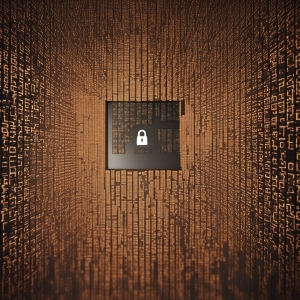Table of Contents:
In an era marked by technological advancements, it is impossible to overlook the transformative role of blockchain in various sectors. Originating as the technology backbone for cryptocurrencies like Bitcoin, blockchain now transcends boundaries, offering revolutionary solutions for industries far and wide. One area where it particularly shines is in enhancing modern cybersecurity frameworks.
With increasing cyber threats in this digital age, security has become a top concern for businesses, governments and individuals alike. That's where blockchain technology comes in, promising a better and more secure future.
The Best Mining Providers at a Glance
» Infinity HashFrom our perspective, currently the best mining provider on the market. With the community concept, you participate in a mining pool completely managed by professionals. A portion of the earnings are used for expansion and maintenance. We've never seen this solved as cleanly anywhere else.
» Hashing24A well-known and established cloud hosting company. With a good entry point and in a good market phase, a good ROI can also be generated with some patience. Unfortunately, we see the durations as a major drawback.
But what is this blockchain technology we speak of, and how exactly does it bolster cybersecurity? Let’s dive in!
What is Blockchain?
At its core, blockchain technology can be thought of as a decentralized digital ledger of transactions. But unlike conventional databases, these transactions carried out across several systems are not controlled by any central authority. Rather, each transaction is added to a 'block', and each block is 'chained' to the previous one. Making sophisticated use of cryptography, once data is recorded in the blockchain, it is nearly impossible to change—it is effectively permanent and tamper-proof.
Picture thousands of computers, or 'nodes’, across the world simultaneously maintaining your spreadsheet with each one holding the entire history of it. If anyone attempts to alter an entry, everyone on this network instantly knows something is amiss – this is the ‘trustless’ nature of the blockchain, requiring no central authority to verify or authorize the transactions.
But how does this advanced technology promise enhanced cybersecurity? To answer that, we need to explore the unique features of blockchain that make it ideal for bolstering digital security.
Blockchain's Role in Improving Cybersecurity
With its profound and radical features, blockchain offers immense potential to fortify cybersecurity measures. Let us now walk through some key areas where this promising technology makes significant strides.
Data Integrity and Transparency: Blockchain ensures every transaction is permanently recorded, creating an immutable and transparent record. This fortifies data integrity, minimizing the risk of data tampering, fraud, and malicious cyber attacks. Additionally, the transparent nature of the blockchain means that any unauthorized alterations to the data would be immediately noticeable, boosting security.
Decentralization: The decentralized nature of blockchain is perhaps its most potent weapon against cyber threats. Since there is no central point of failure, it is harder for cyber criminals to breach a system or manipulate data. Each node in the blockchain network operates independently, making it highly resilient to attacks.
Encryption and Authentication: Blockchain uses advanced cryptographic techniques to secure the data transmission, emphasising both confidentiality and authentication. In other words, only those with the right cryptographic keys can access the data, automatically safeguarding it against unauthorized access and enhancing security.
Preventing DDoS Attacks: Distributed Denial of Service (DDoS) attacks are a significant cybersecurity threat, where attackers overwhelm a network with traffic causing services to crash. The distributed and decentralized nature of blockchain networks inherently mitigates this threat, enabling an efficient, resilient defense mechanism against such attacks.
These powerful features offered by blockchain make it a potent tool in bolstering cybersecurity measures, changing the game in defense against mounting cyber threats.
Pros and Cons of Blockchain in Cybersecurity
| Pros | Cons |
|---|---|
| Decentralization makes it difficult for hackers to perform an attack. | High energy consumption due to proof-of-work is environmentally unfriendly. |
| Transparency increases trust in data integrity. | It is challenging to change data once it's added, making error correction difficult. |
| Enhances privacy through pseudonymity. | Not all blockchains are perfectly secure and can still be susceptible to attacks. |
| Immutable records can help in identifying and rectifying cyber attacks. | Legal and regulatory challenges related to blockchain technology. |
Practical Use Cases of Blockchain in Cybersecurity

The use of blockchain in enhancing cybersecurity isn't mere paper talk; it's already being implemented in various practical scenarios. Here are a few examples of its real-world application:
Secure Communication Channels: Blockchain technology can be used to develop secure, private communication platforms. It facilitates end-to-end encryption, ensuring only the intended recipient can read the message. Businesses, government agencies, and even private users can utilize this feature for secure communication.
Shielding IoT Networks: Internet of Things (IoT) devices, though revolutionizing our lives, are notorious for their security vulnerabilities. With blockchain technology, we can ensure data integrity and authorization in these devices, significantly reducing the risk of attacks.
Preventing Identity Theft: Personal data stored on centralized servers is always at a risk of identity theft. Blockchain, with its decentralized, transparent nature and robust encryption, can help prevent data breaches and identity theft.
Supply Chain Security: Blockchain can guard every step of a supply chain. Each transaction in the process is recorded in a block and linked to the preceding one, ensuring an auditable trail and enhancing cybersecurity.
As we march into a technologically advanced future, it's evident that blockchain's role in cybersecurity will only continue to grow.
Conclusion: The Future of Cybersecurity and Blockchain's Role in It
In conclusion, the need for robust cybersecurity mechanisms in our increasingly digitized world cannot be understated. The myriad of threats ranging from data breaches, to DDoS attacks or even identity theft underpin the urgency of fortifying our digital frontiers. As we march into the future, the role of disruptive technologies such as the blockchain will become only more crucial.
Through its immutable nature, the decentralization of data, advanced encryption techniques and overall transparency, blockchain certainly promises a higher level of security, privacy and trust in the digital realm. To combat sophisticated cyber threats, we will need equally sophisticated technologies and methodologies. Blockchain offers precisely this cutting-edge solution, with immense potential to revolutionize cybersecurity as we know it.
While it may not be a magic bullet for all security concerns, blockchain's inherent features make it a potent tool in the toolbox of cybersecurity measures. The journey to full-fledged adoption of blockchain in cybersecurity may not happen overnight, but as we move forward, we can expect more innovative solutions harnessing this game-changing technology.
The future of cybersecurity is increasingly looking like it will be intertwined with the forward march of blockchain technology. By embracing this shift, we can look forward to a more secure, transparent and reliable digital ecosystem.
Understanding Blockchain's Impact on Cybersecurity

What is blockchain technology?
Blockchain is a decentralized and distributed digital ledger that records transactions across many computers so that any involved record cannot be altered retroactively, without the alteration of all subsequent blocks.
Why is blockchain considered revolutionary for cybersecurity?
Blockchain, with its secure and transparent nature, can provide robust security measures against different types of cyber threats. The decentralized feature of blockchain makes it less susceptible to hacking and the immutable nature makes data tampering nearly impossible.
What are the potential applications of blockchain in cybersecurity?
Blockchain can be used in securing online identity, ensuring data integrity, preventing DNS attacks, and improving IoT security among other applications.
Can blockchain prevent cyber attacks?
While blockchain cannot eliminate all cyber threats, it provides a new layer of security that can significantly reduce the risk of certain types of attacks.
What are the challenges of implementing blockchain in cybersecurity?
Challenges include the need for substantial processing power, the current lack of standards and regulations around blockchain, and the fact that technology is still at a developmental stage with inherent software bugs and vulnerabilities.










